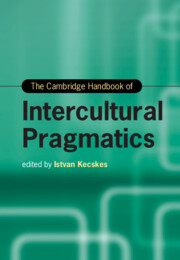Book contents
- The Cambridge Handbook of Intercultural Pragmatics
- Cambridge Handbooks in Language and Linguistics
- The Cambridge Handbook of Intercultural Pragmatics
- Copyright page
- Contents
- Figures
- Tables
- Acknowledgment
- Contributors
- Introduction The Rise of Intercultural Pragmatics
- Part I Theoretical Foundation
- Part II Key Issues in Intercultural Pragmatics Research
- 5 The Cultural, Contextual, and Computational Dimensions of Common Ground
- 6 Role of Context
- 7 (Mis/Non)Understanding in Intercultural Interactions
- 8 Creativity and Idiomaticity in Intercultural Interactions
- 9 Metaphors in Intercultural Communication
- 10 Common Ground in Linguistic Theory and Internet Pragmatics: Forms of Dynamic Multicultural Interaction
- 11 Vague Language from a Pragmatic Perspective
- 12 Humor in Intercultural Interactions
- 13 Emotion in Intercultural Interactions
- 14 Research Methods in Intercultural Pragmatics
- Part III Interface of Intercultural Pragmatics and Related Disciplines
- Part IV Intercultural Pragmatics in Different Types of Communication
- Part V Language Learning
- Index
- References
6 - Role of Context
from Part II - Key Issues in Intercultural Pragmatics Research
Published online by Cambridge University Press: 29 September 2022
- The Cambridge Handbook of Intercultural Pragmatics
- Cambridge Handbooks in Language and Linguistics
- The Cambridge Handbook of Intercultural Pragmatics
- Copyright page
- Contents
- Figures
- Tables
- Acknowledgment
- Contributors
- Introduction The Rise of Intercultural Pragmatics
- Part I Theoretical Foundation
- Part II Key Issues in Intercultural Pragmatics Research
- 5 The Cultural, Contextual, and Computational Dimensions of Common Ground
- 6 Role of Context
- 7 (Mis/Non)Understanding in Intercultural Interactions
- 8 Creativity and Idiomaticity in Intercultural Interactions
- 9 Metaphors in Intercultural Communication
- 10 Common Ground in Linguistic Theory and Internet Pragmatics: Forms of Dynamic Multicultural Interaction
- 11 Vague Language from a Pragmatic Perspective
- 12 Humor in Intercultural Interactions
- 13 Emotion in Intercultural Interactions
- 14 Research Methods in Intercultural Pragmatics
- Part III Interface of Intercultural Pragmatics and Related Disciplines
- Part IV Intercultural Pragmatics in Different Types of Communication
- Part V Language Learning
- Index
- References
Summary
The concept of context has undergone some fundamental rethinking in the scientific community. Rather than being considered an external constraint on linguistic performance, context is analyzed as a product of language use and thus as an interactional achievement, which is negotiated and co-constructed, imported and invoked. Context and contexts are analyzed from the perspectives of interlocutors, considering contextualization, recontextualization and decontextualization, and entextualization. The complexity, multilayeredness and dynamics of context have far-reaching implications on its role in intercultural pragmatics with interlocutors from different linguistic backgrounds having diverging meaning-making processes, diverging contextualization conventions, and thus diverging constructions of context. Intercultural pragmatics thus calls for context-sensitive particularizations of the fundamental premises of cooperation, contextualization, meaning-making process, and negotiation of discourse common ground.
Keywords
- Type
- Chapter
- Information
- The Cambridge Handbook of Intercultural Pragmatics , pp. 139 - 163Publisher: Cambridge University PressPrint publication year: 2022
References
- 1
- Cited by

